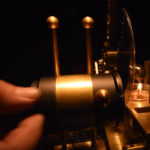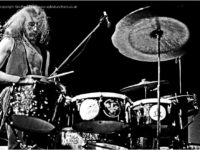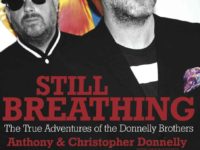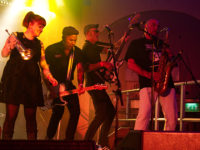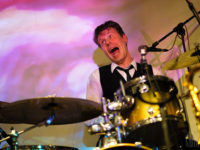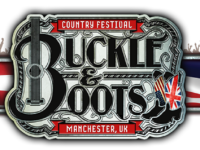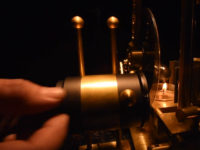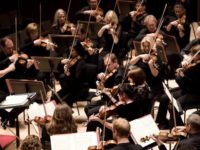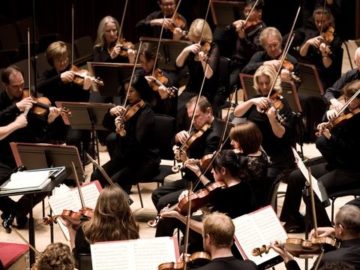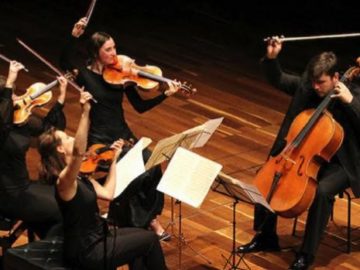By Nimrod
Is Contemporary Classical Music Relevant?
Over the upcoming months, I’ll be writing a series of articles on music and the music business from the inside, so to speak! I start with this one, which obviously as a composer , is close to both my heart and head, highlighting a major problem for the traditional classical music lovers, performers, promoters, etc. Question: Are the ‘classical’ music establishment, academics, media producers shooting themselves in the musical foot, so to speak, by being slightly stuffy, snobby, elitist, by a feeling of they and there music is totally superior to others? Also, self denial is never a good thing is it, and as the ‘classical’ music as such, becomes slightly left behind in a fast moving global music industry, are the establishment and academics not willing to give themselves a reality check maybe, is that the problem? I hope after you’ve read this, you’ll have an answer, or even maybe more questions, because as music lovers we all need to keep music, in whatever genre, alive, out there, vibrant and flourishing!
Firstly: What are our thoughts on what traditional classical music is really anyway? At first thought, erm, a load of people in dinner jackets and smart dresses sitting bolt upright, in a concert hall, listening to old, sometimes oldish music played by a load of other people in dinner jackets and smart dresses. Well, to only to a certain extent is this actually true, but this is obviously not the whole story.
The term ‘classical’ whilst widely understood to be music either orchestral, or chamber music, anything with a lot of string players, etc, the word is actually a misnomer, as it actually means a specific and short period of musical development between the 18th and 19th centuries. But we generally refer to it now as music using the orchestral instruments such as: woodwind, brass, percussion, or strings, and any combination in between. How does this stuff relate to other contemporary music and performers? Say for instance, if we take a look at how our contemporary music and how it’s instruments have come about, we may well see a connection between all genres.
Okay, so let’s look at the normal rock band line up. The bass guitar originally developed as an electric instrument, from the double bass, a mainstay of the orchestra, which dates back centuries. The electric guitar was development of the traditional acoustic guitar, whose direct ancestor was the classical/spanish guitar of people like Giuliani, and Tarrega. In fact if we look at the gibson ES335 for instance, the initials stand for Electric Spanish, so makes a good example of cross genre developments. In fact if you fill in the 2 cutaways in the body, and then I reckon you’ll get what I mean. The Drum kit, a mixture of percussion instruments, well, that comes originally obviously from old style military band which the orchestral composers used for scary, dramatic exciting effects, or just keeping a pulse. Keyboards/Synths, now with those luscious sampled sounds of numerous instruments, but the original instruments they were developed from was the great catherdal organs which were in every major city across europe. At that time hey used a series of so called ‘stops’ which created the sound of brass, flutes, etc, whatever the composer would need in his musical vocabulary at the time. Pianos, well, they’re just still pianos the style would have Beethoven would have recognised, except for the digital ones of course but he’d have loved them as equally I’m sure! Most groups of musicians from brass bands, jazz bands, etc, all use a varied combination taken from the historical use of orchestral players and their instruments. Say for instance the jazz violin, folk fiddle, all come from same heritage as the great Cremona violin makers used in classical music. So, we can now see that ‘classical’ instruments have been used/adapted/developed into our more modern counterparts for playing multiple genres for decades now. An interesting point here to also notice, is the wide use of these so called ‘classical’ musical instruments played alongside traditional band line ups, everybody from Nirvana (Unplugged), through to Pink Floyd(Atom Heart Mother), from Metallica(S+M) to Elbow(most albums now), and many, many more contemporary musicians have added the ‘classical’ effect to their tracks/songs, to give that extra colour to their creative work, particularly the strings.
Secondly: So, all that being said, it sounds like a very positive time for classical players and writers doesn’t it. But we, I say we as I’m one of them, seem to have allowed to develop, a situation where there are two tribes at war with one another – two extremes of musical ideologies at work in the classical medium. To quote a few of my professional orchestral and chamber music friends, there is either ’squeaky door music’, and then there is the ’syrupy sweet’, or ’nice’ music – to quote myself here. These it seems to me, are the only accepted types followed by the ‘powers that be’ apart from possibly the so called early music festivals and concerts, but don’t get me started on that – well not yet, anyway!
Festivals of only 20th Century, or even only 21st century music are, or at least can, or could be great events – I also know of another particular festival where only melodic, uplifting, nice tonal music such as film, or game music is allowed to be performed, another one where anything that has not been written today and is so called experimental it seems to me, is not allowed. Already we have people dividing into specific musical camps with only their likes, dislikes, never wanting to hear an alternative creative musical voice so to speak. Radio stations as well choose what the listener hears, which has to meet certain criteria to deliver to listening audiences. Who decides the criteria, the chosen or accepted works for these performances, and broadcasts must meet, before they are approved, or even allowed the ‘privilege’, of being part of their festival?
As a composer, I have had my works performed at both these type of festivals which is great, but it started me thinking a long time ago – is this why classical music seems to be dying, two complete musical opposite camps? Also, just what is classical music and what is not? As I mentioned earlier it doesn’t really exist, so suppose it’s just an easy way for marketing music, radio stations, record labels, promoters, academics trying to stick a label on what classical music is, all thinking they control peoples particular likes and dislikes, whats good, and whats bad and of course, these people, they know best? As a professional composer from my teenage years, I have worked in all genres, from folk music, through rock, and pop, and everything in between, and still do so, after all music is just music to me! Co-writing songs, doing arrangements for both recordings, and live gigs with some fabulous artists, all the while writing my own orchestral, opera, choral, and chamber music introduced me to such a wide variety of fabulous musical cultures. Which, for these obvious reasons my music is actually quite eclectic, sitting in the absolute middle of all music I suppose, and to be honest I do think most peoples taste in music is also extremely wide too. You only have to look through peoples cd, vinyl collections, or more recently spotify/itune streaming and download playlists to see what I’m getting at.
Thirdly: As audiences of ‘ traditional’ classical music grow older – often the average age of a large part of the audience being well over 55 years age range, with only a few younger faces appearing around the hall, what is going to happen when they’re not around? The younger faces, are they enthusiastic concert goers who really wish to hear the programme on offer, or possibly music students hoping to absorb some of the music adding to their musical knowledge, or advised to attend by their lecturers, and also gain marks for just attending – yes I’ve seen this happen too? We will certainly have an upcoming major problem of ticket sales for classical concerts, as opposed to rock, or even jazz gigs, as all age groups are drawn into what seems like more relevant musical styles to contemporary audiences – this goes for radio, and online platforms too of course.
The two sides of classical music, even amongst contemporary performers, and composers, are slightly tribal in the way they approach everything, again which I have seen, and continue to see. Then if you throw in the standard repertoire of classical, romantic, or early 20th century music we have so much great music available for performance by orchestras, chamber ensembles and soloists, in this, the so called ‘classical’ world that we’re discussing, what is going wrong? So, why is this genre struggling, possibly dying as some people think and say? Although if you were to believe what has been said in the press recently, in some cases apparently young people are turning to classical music to drown out the noise of everyday life – suppose whatever floats your musical boat I guess with that one! You do get the ‘ contemporary’ enthusiasts, who often just spout out at you how clever it all is, how interesting such and such is, what the music invokes, or what it’s supposed to invoke in you, how intellectually challenging such a piece is, etc, etc. Then of course if you don’t understand, or even dislike it you’re made to feel very unwelcome and slightly stupid. This is especially true if you ever question anything in the concert – be it the music, the ideology behind it, or well anything in fact really. This of course can immediately alienate a lot of potential audience members from attending, or even radio listeners to change channels. From what I’ve experienced, and seen over my long career the concert/ festival organisers don’t particularly seem to mind that either – superiority and musical thought control springs to mind here! Yes, even in the ’traditional’ classical concert of older works, indeed the same applies here, you must like Beethoven, or Wagner only, etc. I don’t know where all this came from, but I want it to stop – right now! As the future of classical music could indeed falter and fail unless the ‘establishment’ changes it attitude, elitist approach, snobbery and opens up its eyes on what is going in the rest of the musical world. Yes, obviously, there are things which aren’t perfect here either, but at least these different genres are always tackling each issue as it comes along, and are willing to share a forward thinking approach to their industry, but more about that later. People build walls to keep people out, and other people in, the classical music establishment has been making those walls higher by the year, it’s time we considered dismantling them and join the rest of wider musical culture out there.
Fourthly: There are many great individual musicians, orchestras, chamber groups, concert halls, promoters, who strive to bring the best of ‘new music’ to the fore in their concerts, which are mainly made up of more ‘traditional’ works. This means, we have the real opportunity to hear new, contemporary composers works played alongside the standard repertoire, where it stands up there, as it were, as an equal and has the chance to speak for itself. Having a totally balanced programme of music in concerts covering all eras from, say 300 years ago to something written just yesterday, with the ink still wet, that would be a perfect gig to me. Luckily a few enterprising performers, composers, and organisers are trying really hard, and notice the audience response when introducing a newly written piece is alongside Brahms, the contemporary work being respected with open ears, as Brahms music was new once of course.
On another intimidating bugbear, I notice all the time in fact, that there is way too much written word in contemporary printed concert programmes for the audience to read. Why is this so necessary, trying to explain in so much detail, way too much information in my opinion, whats that about really, slightly unnecessary The music should stand up on it’s own, after all the term ‘music’ really sort of means organised sound, so let’s just hear it. There is nothing more irritating to me in a concert than having your head literally buried in pages of paper and ink, describing the work we’re supposed to be listening to and be focussed on. Then before you know it, the piece is finished and we’ve only half listened – how can you possibly appreciate a work like that? The notes are so complex, and in some cases you’d need a postgraduate degree in either music, maths, or philosophy – or all of them to understand. Can we not write music as a musical language that speaks to us anymore, all other genres manage this easily, maybe not, but, please let the music do it’s own stuff, don’t intellectualise it – please – this would make the music so much more approachable and less intimidating to new audiences.
Another thing to think about, why does Baroque, Classical, Romantic music makes up the programmes of most ‘classical’ concerts now? Obviously, I’d understand if it was the 19th, or 20th, but this is the 21st century, we have multiple formats, internet platforms to listen to such a wide and varied choice of music. Let’s be more adventurous people, and lets invite contemporary music to join the established concert works, and vice versa, imagine this in every concert, solo, chamber, orchestral, even opera, what a fantastic adventure this would become!! We have some fantastic composers, who are still alive, and kicking out here and many enlightened performers wishing to perform their work.
Fifthly: Why in the ‘classical’ field do we have such divided lines, where both sets of protagonists have set there own battle lines, dug their own trenches and it seems they are antagonistic and possibly arrogant in how and why they think they are each right, meaning there is no other way than their way. How did we get here then, especially when the same musicians play both types of music and actually enjoying the chance of playing a varied repertoire, making them more enlightened as performing musicians? So many lost opportunities to share experiences, for both the artists involved, especially the audiences too, surely thats really important – it’s not all about the organisers, they’re not the reason for music after all, are they!
Now then, why is it that we can’t have contemporary festivals where all styles of ‘contemporary classical’ (again I hate that phrase by the way, but will have to suffice, as it’s easily understood, I think) music; atonal, tonal, minimalist, melodic, soundtracks, experimental, etc, not totally seperated by composers individualistic style, or the promoters/artistic directors personal preference. This would be great, as it would bring the many composers of all these varied artistic ideas together with a mixed audience of music lovers, with their favourite composers, modern and old, which everybody then has the opportunity to hear alongside the standard repertoire. This, I think would be a perfect solution because the system, as it stands is certainly not fit for purpose in either side in this musical debate, when it divides the art of music in such a destructive way, creating a war in this tonal conflict of musical ideology.
We only have to think of the big, and even the very small music festivals, each summer, of other contemporary music Glastonbury, Green Man, Big Chill, Kendal Calling, etc, where such a wide variety of music can be heard. Everyone walks around while waiting for their favourite artist/s to appear, taking the opportunity to go to the loo, or for food, and then to pop over other stages to hear, enjoy and devour music and artists who, strangers at first yes, but often not after the festivals end, as they return home and seek out recordings, other concerts and more info on these new, inspirational creative thoughts and feelings! Now, this is what the classical music world is definitely missing, in a seriously big way unfortunately. So instead of in fighting about which is most relevant, good and bad, academic, non-academic, who cares about all this, music is way bigger than the so called classical academic experts, or musicologists, let’s just be open and appreciate the amazing variety of music out here, no one is better than another, all the performers and composers from other genres are deserving of as much respect as each other. The willingness to listen and understand different music, some people may be very much surprised by their own reaction and appreciate – surprise, surprise that after all music is music. There are some wonderful people out there working proactively, trying to open the gates, and doing all this . I recently went to a fabulous concert where not only did the soloist chat directly with the audience, but the world renowned conductor introduced each orchestral work, with a bit of background info, and also encouraged people to applaud when they felt it – as in a rock, or folk concert. The orchestra had also been working with schools, taking the music into their environments, sharing the music they love with a potential future audience – now thats the perfect way.
Having spoken at many conferences and festivals about music, I do remember one particularly, occasion where I spoke against the cuts to music education in schools, and the possibility that only ‘ classical’ music was the only legitimate genre that would be, if any, be taught and accepted in the curriculum. I pointed out at the time to those gathered there, industry experts, colleagues, and including a few MPs, that all music is equal, and there should be no snobbery, genre bias, etc, and folk, rock, jazz, world music, should all be available, and encouraged for study, in a perfect world. Mind you, also I did point out at the time that in ‘Pete’s world’ , Prog Rock would be there at the forefront of it all!!
Finale: So, come on everyone, all composers, academics, admin people, presenters, etc, of the classical world, open up your arms, minds and ears, and welcome the many different approaches, yes, but also work together for a greater good, and that is good is music. Remember too, music is not just about the intellect, but also a way of expressing the human condition, it touches everyone around the world in some way, and is totally part of peoples lives. The opposites are just a tiny spot in the wider world of musical cultures, and we shouldn’t let a personal preference, or prejudice influence what the audiences have the chance to listen in concerts, or on recordings. So, instead of shooting off from the hip, and hitting yourself in the feet, remember, we’re all music lovers, otherwise we wouldn’t do what we do, it’s both a vocation and a profession, in equal measure, or should be. If the big divide is spanned, who knows what fantastic music we’ll have and will be available out there. Also, what new works will be inspired, written, performed in this new openness of music thought. If not, then maybe classical music, in all it’s forms, will die, and unfortunately will deserve to so, as a dinosaur, no matter how much personal affection for it we all may have, will be disregarded and become extinct – please consider this. The term ‘big fish, in a small pool’ springs to my mind here and classical music is the minnow at the moment. But this doesn’t have to be so, as it once was a major part of everyday life, it can indeed be totally relevant again. So, the answer to the question is, yes, contemporary classical music is relevant and should rejoin the wider musical family, and I certainly intend to carry on my work of trying to achieve this!!!

